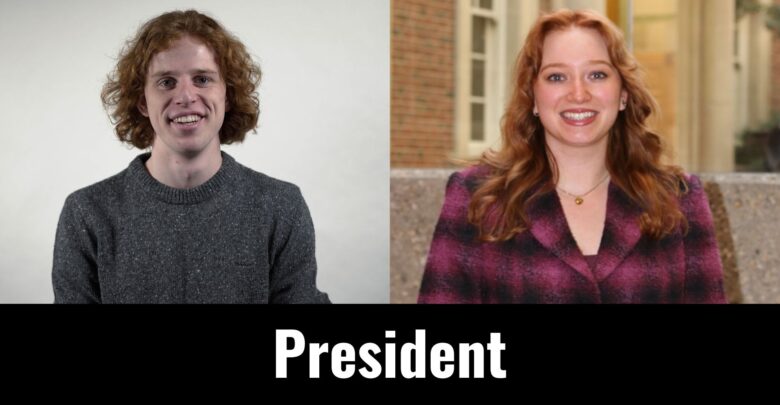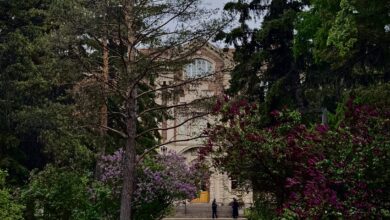SU Elections 2024 Q&A: President
There are two candidates in the 2024 Students' Union presidential race — Lisa Glock and Michael Griffiths.
 Lily Polenchuk, Supplied
Lily Polenchuk, SuppliedThe Students’ Union (SU) president is the chief representative of the SU and all University of Alberta undergraduate students. The SU president sits on the Board of Governors (BoG) and General Faculties Council and acts as an advocate to university administration and all levels of government.
There are two candidates in the 2024 SU presidential race:
- Lisa Glock, a fourth-year political science and women’s and gender studies student
- Michael Griffiths, a fifth-year honours political science student and current SU vice-president (student life)
The following interviews have been edited for brevity and clarity.
Why have you decided to run for president?
Lisa Glock: Frankly, I feel like I’ve come to the end of what I can do in the campus community for issues that I care about through student groups, which was my first avenue trying to do that. I was involved with Women in Leadership to address women’s empowerment and gender issues. And then the Sustainable Development Goals Student Alliance (SDGSA) to work on sustainability. But I feel like I’ve done all I can through those and I want to do more to help out on campus and address these issues. I think I can do those best through president. The reason I didn’t go for any of the other portfolios is because I think I function best in a team management situation and I wanted to address multiple issues through the different portfolios. As president, I can touch on multiple different things instead of just one.
Michael Griffiths: I was fortunate enough to come to the U of A in 2019, just before the onset of the COVID-19 pandemic. I was happy to get a glimpse of how much potential this institution has before we experienced a pandemic and $222 million in budget cuts. Since then, it’s gotten much harder for students to pursue their education, and more difficult to afford it. We have to spend more time working rather than focusing on our studies or being involved on campus. And so now, more than ever, I really think that students need strong leadership and a strong SU to help tackle some of those challenges. We need leadership that knows how the system works and can navigate it effectively to really help drive for students and unlock some of that attention.
What would you say are the three main takeaways from your platform?
Glock: I’ve narrowed it down to holistic approaches to sustainability, growing community connections, and safety and gender issues on campus. For holistic sustainability, I know that’s a very broad topic. It’s everything from something as small as improving the water fountains on campus so people are more encouraged to use their bottles, to more conceptual things like providing better Wi-Fi and charging outlets everywhere so students stay on campus. This way there’s less use of cars back-and-forth because [students are] more comfortable staying there longer. Even something as simple as lights that are motion-sensor activated to lower electricity costs for the university. Hopefully that’s also applied to tuition. And of course, gender and sexuality issues. A big thing for me is the U of A Sexual Assault Centre and providing menstrual cups with sustainable options.
Griffiths: My platform focuses on the three different areas of student life. Student life at the university, student life and how it interacts with the SU, and then student life in Alberta and beyond. At the university, we want students to have a good experience here. They should be able to access supports like counseling and clinical services; have a flexible academic calendar that allows them to pursue their academics; and get accommodations where needed and affordable textbooks. At the SU, they should be able to get involved on campus in clubs and events, feel that their organization is accountable, and that it empowers them to be successful leaders. In Alberta, we need to establish strong alliances with our counterparts and really make our case to the government for why the U of A needs to be well-funded and why they need to support enrolment growth at the university going forward.
How would you make sure every student in the student body is represented and feels supported by the SU?
Glock: This is a big thing for me and my platform point about community and connection. I wanted to specifically address the lack of connection that there is between students from Campus Saint-Jean and Augustana. I want to incorporate these campuses more and see what their issues are that might be different from ours.
Also, students living on-campus and off-campus often connect less than students who live on-campus connect with each other. Also, a big point for me is a lot of student groups could really serve as lobby and interest groups for the SU. A lot of them focus on really niche issues — specific cultural groups, or something like sustainability. They are our best outreach for how these ideas impact students. I think we need more connectivity with student groups to focus on these issues.
Also, I think president has become too lofty — and all the SU executives, in fact. I think we should be seen as regular students. And also just mingle and interact with the student community and open our doors for people to come and talk to us much more than they do.
Griffiths: The first thing that this involves is, of course, collecting student perspectives and listening to them. For the campaign, that’s a great chance to engage, but also hosting tabling sessions and getting out and talking to students. If I’m elected, this can be done through more survey-style stuff, collecting student perspectives. But also when we have key issues, actually reaching out to groups, students, and clubs. Talking to them about what that looks like. And then incorporating those perspectives into our decisions.
And after the decisions are made, I think really promoting everything that went into the decision and why that decision was made the way it was. Giving all that information to the students as well, so that they understand the pressures we’re facing and understand how we incorporated their perspectives.
Amid concerns regarding safety and freedom of expression on campus, amplified by the violence in Israel and Palestine, many students have expressed that they don’t feel supported by the university. How would you, as president, address these concerns going forward?
Glock: Firstly, I want to say for the Palestinian issue, I have always made my views on that very clear. My student group, the SDGSA, put out a statement in support of Palestinian students that can be found online on our Instagram. I just want every student to feel safe and I want every student to have the same access to resources and supports — the supports that the university provides to students in any crisis, be that an economic crisis in their home country, an ecological crisis or a war, or a genocide. They should have much more supports available and the same supports, across spectrums of different issues that they face. And more education provided on campus about these crises so that people can build understanding amongst one another, and so that animosity doesn’t grow.
Griffiths: One thing that we started this year and we’ll have to continue next year is when students don’t feel supported by their university, that their SU can be another platform that gives them those opportunities to express themselves and get engaged. One of the best ways we do this is through student clubs and providing venues, spaces, and supports to students to organize and start expressing their views. We’ve helped student clubs get off the ground in relation to Israel-Palestine this year, start to build camaraderie and support on campus, and make sure that they don’t experience barriers to organizing and demonstrating for their cause. Part of this involves working with the university to make sure these barriers are limited. But also us as a SU really fostering spaces for students to express their concerns, get their voice out there, and get engaged.
Right now, affordability is on top of mind for students. In March 2024, the Board of Governors is set to vote on another round of tuition increases for both domestic and international students, on top of the ongoing cost of living crisis. As the SU president, how will you address these concerns?
Glock: Affordability is a really big issue especially. We can see it through the use of the Campus Food Bank going up. So I think something we can look into is expanding that program, maybe even creating something like food-related subsidies. But fighting for lower tuition is a big thing on my agenda and trying to address that through lowering costs.
A lot of my sustainability initiatives lower the cost of operating the university, like through lowering our electrical bill. Making things more accessible through sustainability, I think, is going to lower a lot of costs. I hope that will also be able to give us a better arguing block.
I also want to potentially work with other universities and other college campuses in Edmonton, and maybe across Alberta, to try to fight this together as a community. And also talk to international students about the issues they’re facing and make the information about unaffordability more known before they come here.
Griffiths: One of the most crucial ways we can do this is to really raise awareness up to the provincial government. Our university has experienced significant budget cuts and it starts with demonstrating to the province the value that the U of A brings to our province. That not investing in post-secondary and in our students here will hurt Alberta in the long-run.
Another thing that we can do on campus is try and save students money wherever possible. This can mean promoting programs like the Zero Textbook Cost (ZTC) initiative to keep textbook costs low, and increasing our student discounts for students and clubs at our SU businesses and venues.
Then the final thing is really keeping the university in check and asking them to limit costs wherever possible. But also pushing them to promote the financial supports that they have available to students. So the $1 million that they increased to moderate standard of living this year and the tuition offset — really advertising those as financial supports that are available for students.



